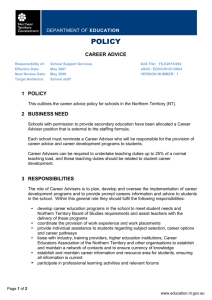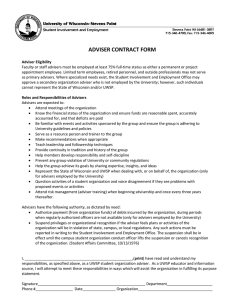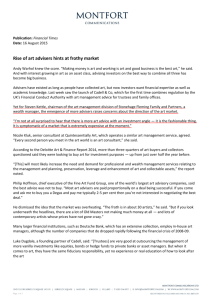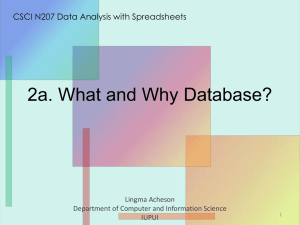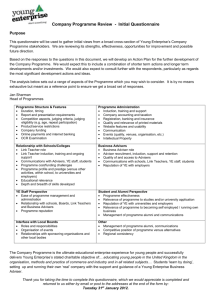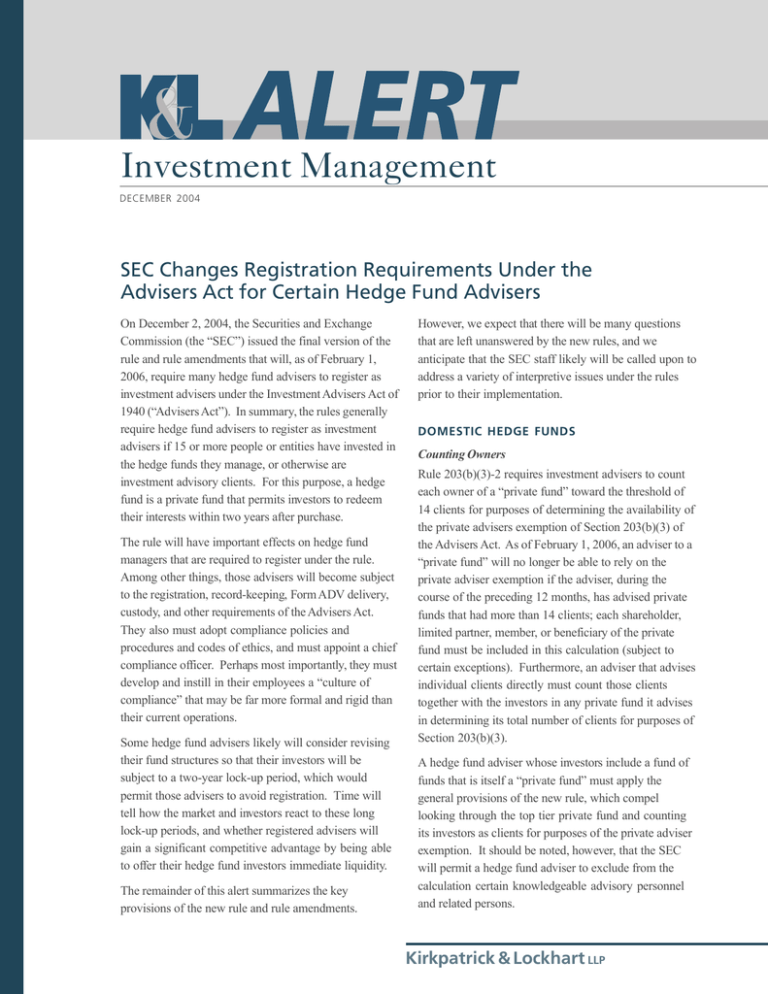
Investment Management
DECEMBER 2004
SEC Changes Registration Requirements Under the
Advisers Act for Certain Hedge Fund Advisers
On December 2, 2004, the Securities and Exchange
Commission (the “SEC”) issued the final version of the
rule and rule amendments that will, as of February 1,
2006, require many hedge fund advisers to register as
investment advisers under the Investment Advisers Act of
1940 (“Advisers Act”). In summary, the rules generally
require hedge fund advisers to register as investment
advisers if 15 or more people or entities have invested in
the hedge funds they manage, or otherwise are
investment advisory clients. For this purpose, a hedge
fund is a private fund that permits investors to redeem
their interests within two years after purchase.
The rule will have important effects on hedge fund
managers that are required to register under the rule.
Among other things, those advisers will become subject
to the registration, record-keeping, Form ADV delivery,
custody, and other requirements of the Advisers Act.
They also must adopt compliance policies and
procedures and codes of ethics, and must appoint a chief
compliance officer. Perhaps most importantly, they must
develop and instill in their employees a “culture of
compliance” that may be far more formal and rigid than
their current operations.
Some hedge fund advisers likely will consider revising
their fund structures so that their investors will be
subject to a two-year lock-up period, which would
permit those advisers to avoid registration. Time will
tell how the market and investors react to these long
lock-up periods, and whether registered advisers will
gain a significant competitive advantage by being able
to offer their hedge fund investors immediate liquidity.
The remainder of this alert summarizes the key
provisions of the new rule and rule amendments.
However, we expect that there will be many questions
that are left unanswered by the new rules, and we
anticipate that the SEC staff likely will be called upon to
address a variety of interpretive issues under the rules
prior to their implementation.
DOMESTIC HEDGE FUNDS
Counting Owners
Rule 203(b)(3)-2 requires investment advisers to count
each owner of a “private fund” toward the threshold of
14 clients for purposes of determining the availability of
the private advisers exemption of Section 203(b)(3) of
the Advisers Act. As of February 1, 2006, an adviser to a
“private fund” will no longer be able to rely on the
private adviser exemption if the adviser, during the
course of the preceding 12 months, has advised private
funds that had more than 14 clients; each shareholder,
limited partner, member, or beneficiary of the private
fund must be included in this calculation (subject to
certain exceptions). Furthermore, an adviser that advises
individual clients directly must count those clients
together with the investors in any private fund it advises
in determining its total number of clients for purposes of
Section 203(b)(3).
A hedge fund adviser whose investors include a fund of
funds that is itself a “private fund” must apply the
general provisions of the new rule, which compel
looking through the top tier private fund and counting
its investors as clients for purposes of the private adviser
exemption. It should be noted, however, that the SEC
will permit a hedge fund adviser to exclude from the
calculation certain knowledgeable advisory personnel
and related persons.
Kirkpatrick & Lockhart LLP
Definition of “Private Fund”
Changes to Performance Fee Rule
The SEC will now define a “private fund” by reference
to three characteristics that it believes are shared by
virtually all hedge funds, and that differentiate hedge
funds from other pooled investment vehicles such as
private equity funds, venture capital funds, and
pension plans.
The SEC added grandfathering provisions to Rule
205-3 under the Advisers Act, the performance fee
rule, to avoid disrupting existing arrangements
between newly-registered hedge fund advisers and
their current pool investors or separate account
clients. Most hedge fund advisers charge a
performance fee based on their funds’ capital gains
or appreciation; however, the SEC’s rules permit
registered investment advisers to charge performance
fees only to “qualified clients.” The SEC has revised
Rule 205-3 to permit existing investors in any
3(c)(1) fund to retain their investment and to add to
it even if they are not qualified clients, and to permit
the newly-registered advisers to continue advisory
contracts they may have with other clients that are
not qualified clients, so long as the clients invested
or entered into investment management contracts
before February 10, 2005.
1. Sections 3(c)(1) and 3(c)(7).
A fund will not be a “private fund” unless it is a
company that would be subject to regulation under
the Investment Company Act of 1940 but for the
exceptions from the definition of “investment
company” provided in Section 3(c)(1) or Section
3(c)(7) of that Act. Thus, advisers are not required to
“look through” most clients that are business
organizations, including insurance companies,
broker-dealers and banks, as well as bank common
trust funds and bank collective investment funds.
2. Redemption Within Two Years.
A company will be a private fund if it permits
investors to redeem their interests within two years
of purchase. The rule does allow a fund to offer
redemption rights under extraordinary
circumstances without being considered a private
fund. Advisers must apply the two-year redemption
test to any investments made on or after February 1,
2006, whether those investments are made by new
or existing investors.
3. Advisory Skills, Ability, or Expertise.
A company will be a private fund only if interests in
it are offered based on the investment advisory
skills, ability, or expertise of the investment adviser.
Calculation of Assets Under Management
Rule 203(b)(3)-2 does not alter the minimum amount
of assets under management that an investment adviser
generally must have in order to register with the SEC.
A hedge fund adviser whose principal office and place
of business is in the United States cannot (subject to
certain exceptions) register with the SEC unless it
manages assets of at least $25 million. An adviser to a
private fund may also exclude the value of proprietary
assets as well as the value of assets attributable to nonU.S. persons when calculating the firm’s assets under
management for purposes of the $25 million
registration threshold.
2
Hedge fund advisers that are required to register with
the SEC starting on February 1, 2006, are permitted to
market their performance from periods prior to their
registration with the SEC, even if they have not
maintained documentation that the SEC’s rules would
otherwise require.
OFFSHORE HEDGE FUNDS
Counting Owners
As of February 10, 2005, Rule 203(b)(3)-2 imposes
the same counting requirements on offshore advisers
to hedge funds as it does on offshore advisers
providing advice directly to U.S. clients. Thus, for
purposes of eligibility for the private adviser
exemption, an offshore hedge fund adviser must
look through each private fund it advises, whether or
not those funds are also located offshore, and count
each investor that is a U.S. resident as a client. An
offshore adviser that, during the course of the
preceding 12 months had more than 14 U.S. clients,
including clients that invest in a hedge fund advised
by the adviser, generally must register with the SEC
under the Advisers Act. If an investor is a non-U.S.
client at the time of the original investment, the
adviser may continue to count the investor as a nonU.S. client even if the investor subsequently
relocates to the United States.
KIRKPATRICK & LOCKHART LLP INVESTMENT MANAGEMENT ALERT
Calculation of Assets Under Management
STATE REGISTRATION REQUIREMENTS
An offshore adviser must register with the SEC by
February 1, 2006 if it has more than 14 clients who are
residents of the United States, regardless of the amount
of assets the adviser has under management. An
adviser may not reduce the value of assets under
management by deducting amounts borrowed to
acquire them.
These amendments to the Advisers Act relate to federal
registration only. These amendments, including the
new “look through” counting procedures, do not
change the way clients are counted for purposes of the
national investment adviser de minimis standard (the
standard for determining whether an investment
adviser must register with one or more states).
Advisers to Offshore Privately Offered Funds
OTHER MATTERS
Rule 203(b)(3)-2 also provides that an offshore adviser
to an offshore private fund may treat the fund (and not
the investors) as its client for most purposes under the
Advisers Act (other than for purposes of counting
investors). The SEC does not apply most of the
substantive provisions of the Advisers Act to the nonU.S. clients of an offshore adviser. Yet, unless eligible
for an exemption, the offshore adviser will be required
to register under the Advisers Act, keep certain books
and records, and remain subject to examinations by
SEC staff. Certain other requirements, including the
Advisers Act’s compliance rule, custody rule, and
proxy voting rule, would not apply to the registered
offshore adviser, assuming it has no U.S. clients other
than as investors in one or more offshore funds.
Advisers to Offshore Publicly Offered Funds
Rule 203(b)(3)-2 includes an exception to the
definition of “private fund” for a company that has its
principal office and place of business outside of the
United States, makes a public offering of its securities
in a country outside of the United States, and is
regulated as a public investment company under the
laws of a country other than the United States.
Code of Ethics Deadline Extension
Registered investment advisers must have a code of
ethics applicable to supervised persons, which requires
access persons to submit reports of personal securities
transactions and holdings. In order to allow sufficient
time for the access persons of hedge fund advisers to
receive their year-end brokerage statements and to
submit such holdings reports, the SEC extended the
compliance date for compliance with code of ethics
Rule 204A-1 from January 7, 2005, to February 1,
2005.
Custody Rule Amendments
The SEC amended the Advisers Act custody rule
effective January 10, 2005, to permit advisers to funds
of funds that elect to distribute audited fund financial
statements to investors under the custody rule to
distribute such financials no later than 180 days after
the end of the fiscal year. For this purpose, a fund of
funds is a private fund that invests 10 percent or more
of its total assets in a private fund advised by an
unrelated entity.
JEREMY GAULD
CARY MEER
617.261.3263
jgauld@kl.com
NICHOLAS HODGE
617.261.3210
nhodge@kl.com
DECEMBER 2004
202.778.9107
cmeer@kl.com
ROBERT ROSENBLUM
202.778.9464
rrosenblum@kl.com
Kirkpatrick & Lockhart LLP
Kirkpatrick & Lockhart LLP maintains one of the leading investment management practices in the United States, with
more than 70 lawyers devoting all or a substantial portion of their practice to this area and its related specialties.
We represent mutual funds, closed-end funds, hedge funds, offshore funds, insurance companies, broker-dealers,
investment advisers, retirement plans, banks and trust companies and other financial institutions. We also regularly
represent mutual fund distributors, independent directors of investment companies and service providers to the
investment management industry. In addition, we frequently serve as outside counsel to industry associations on a
variety of projects, including legislative and policy matters.
We work with clients in connection with the full range of investment company industry products and activities,
including all types of open-end and closed-end investment companies, funds of hedge funds, variable insurance
products, private and offshore investment funds and unit investment trusts. Our practice involves all aspects of the
investment company business.
We invite you to contact one of the members of the practice, listed below, for additional assistance. You may also
visit our website at www.kl.com for more information, or send general inquiries via email to
investmentmanagement@kl.com.
BOSTON
Michael S. Caccese
Philip J. Fina
Mark P. Goshko
Thomas Hickey III
Nicholas S. Hodge
George Zornada
617.261.3133
617.261.3156
617.261.3163
617.261.3208
617.261.3210
617.261.3231
LOS ANGELES
William P. Wade
310.552.5071 wwade@kl.com
NEW YORK
Jeffrey M. Cole
Ricardo Hollingsworth
Beth R. Kramer
Richard D. Marshall
Robert M. McLaughlin
Keith W. Miller
Scott D. Newman
212.536.4823
212.536.4859
212.536.4024
212.536.3941
212.536.3924
212.536.4045
212.536.4054
jcole@kl.com
rhollingsworth@kl.com
bkramer@kl.com
rmarshall@kl.com
rmclaughlin@kl.com
kmiller@kl.com
snewman@kl.com
SAN FRANCISCO
Eilleen M. Clavere
Jonathan D. Joseph
David Mishel
Timothy B. Parker
Mark D. Perlow
Richard M. Phillips
415.249.1047
415.249.1012
415.249.1015
415.249.1042
415.249.1070
415.249.1010
eclavere@kl.com
jjoseph@kl.com
dmishel@kl.com
tparker@kl.com
mperlow@kl.com
rphillips@kl.com
WASHINGTON
mcaccese@kl.com
pfina@kl.com
mgoshko@kl.com
thickey@kl.com
nhodge@kl.com
gzornada@kl.com
Clifford J. Alexander
Diane E. Ambler
Mark C. Amorosi
Catherine S. Bardsley
Arthur J. Brown
Arthur C. Delibert
Jennifer R. Gonzalez
Robert C. Hacker
Kathy Kresch Ingber
Michael J. King
Rebecca H. Laird
Cary J. Meer
R. Charles Miller
Dean E. Miller
R. Darrell Mounts
C. Dirk Peterson
David Pickle
Alan C. Porter
Theodore L. Press
202.778.9068
202.778.9886
202.778.9351
202.778.9289
202.778.9046
202.778.9042
202.778.9286
202.778.9016
202.778.9015
202.778.9214
202.778.9038
202.778.9107
202.778.9372
202.778.9371
202.778.9298
202.778.9324
202.778.9887
202.778.9186
202.778.9025
calexander@kl.com
dambler@kl.com
mamorosi@kl.com
cbardsley@kl.com
abrown@kl.com
adelibert@kl.com
jgonzalez@kl.com
rhacker@kl.com
kingber@kl.com
mking@kl.com
rlaird@kl.com
cmeer@kl.com
cmiller@kl.com
dmiller@kl.com
dmounts@kl.com
dpeterson@kl.com
dpickle@kl.com
aporter@kl.com
tpress@kl.com
Francine J. Rosenberger 202.778.9187
francine.rosenberger@kl.com
Robert H. Rosenblum
William A. Schmidt
Lori L. Schneider
Lynn A. Schweinfurth
Donald W. Smith
Martin D. Teckler
Robert A. Wittie
Robert J. Zutz
rrosenblum@kl.com
william.schmidt@kl.com
lschneider@kl.com
lschweinfurth@kl.com
dsmith@kl.com
mteckler@kl.com
rwittie@kl.com
rzutz@kl.com
202.778.9464
202.778.9373
202.778.9305
202.778.9876
202.778.9079
202.778.9890
202.778.9066
202.778.9059
The attorneys resident in all offices, unless otherwise indicated,
are not certified by the Texas Board of Legal Specialization.
®
Kirkpatrick & Lockhart LLP
Challenge us. ®
www.kl.com
BOSTON
■
DALLAS
■
HARRISBURG
■
LOS ANGELES
■
MIAMI
■
NEWARK
■
NEW YORK
■
PITTSBURGH
■
SAN FRANCISCO
■
WASHINGTON
..................................................................................................................................................................
This bulletin is for informational purposes and does not contain or convey legal advice. The information herein
should not be used or relied upon in regard to any particular facts or circumstances without first consulting a lawyer.
© 2004 KIRKPATRICK & LOCKHART LLP.
ALL RIGHTS RESERVED.



